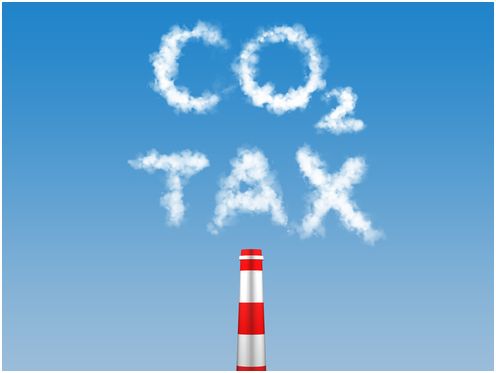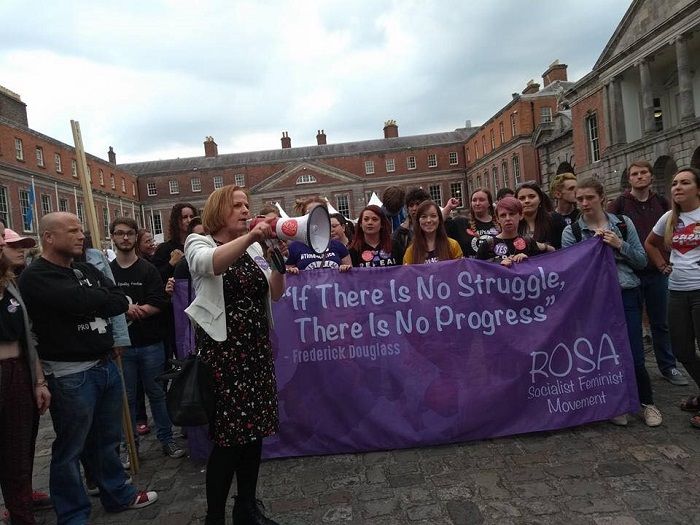Christian Bunke is a member of Linkse Socialistiche Partij / Parti Socialiste de Lutte (ISA in Belgium).
Around the world there are mass protest, especially of young people, demanding urgent action to deal with a climate crisis which seems to be escalating on a weekly basis. Unprecedented wildfires in Australia and California, record water levels in Venice, and rapidly melting glaciers are just some of the many climate disasters making headlines.
As protests spread and grow in numbers, debates about how to solve this crisis also gather pace. Especially in the US, as well as in northern and central European countries, a variety of taxation methods are being proposed.
Ultimately, taxation in capitalist societies is about how the surplus created by the sweated labour of workers is divided up between the different sections of society. It is about who pays for services provided by the state – is it the workers, handing over parts of their wages to fund the government, or is it the bosses parting with some of their profits which in any case would not exist without the exploitation of wage labour? Taxation is therefore an expression of the class struggle itself and the level of taxation plays an important part in defining the living standards of working people under capitalism.
“Who pays” is a question posed every time capitalism faces a crisis. Mass movements against austerity policies by workers and young people swept many countries after the economic crash of 2008-9. The slogan “we won’t pay for your crisis” rang out at mass demonstrations in London, Athens and many other cities. Unfortunately, the trade union and left party leaders proved incapable of leading this resistance to victory, so the bosses were able to make the working class pay. Greece is a poignant example of how an alliance led by the “troika” of the EU, ECB and the IMF slashed pensions, wages and social security all in the name of saving profits for the rich.
So too, today, the working class and poorest layers of society are already suffering and paying the price for a climate crisis they did not create. The Amazon burns to support global agribusiness. Massive oil spills make large areas in Nigeria uninhabitable. Ice caps and the permafrost are melting with ever increasing speed, leading to the dramatic release of methane, a major greenhouse gas, which accelerates further global warming.
Rising sea levels threaten coastal communities on a world scale. The wealthiest cities may hold out for a bit longer than cities in the neo-colonial world and the global south, but in the end no city is safe. Far from the coast, capital cities like Vienna are expected to experience heatwaves of 45oC and higher within decades. This list could go on.
At the same time, because many trade union leaders accept the logic of capitalism, the bosses are able to lean on the concerns of a layer of the working class that their jobs are under threat if serious measures to tackle climate change are taken. Trump blames climate activism for job losses in the American rust belt. Workers in the remaining coal-mining areas of Germany fear that stopping the use of hydrocarbons will affect their livelihoods. Job losses resulting from the developing crisis of overproduction in sections of global manufacturing, especially in the car industry, are being blamed on measures taken to fight the climate crisis.
The capitalist toolkit should be rejected
The climate crisis is escalating after decades of austerity policies. This partially shapes the current debate as pro-capitalist politicians and economists attempt to use the very same neo-liberal toolkit to which they turned to combat the economic collapse to “solve” the climate crisis without reducing profit margins.
Their favorite tool at this stage is a carbon tax. Although there are different forms, the most common proposal is to increase consumer prices for heating, fuel and electricity to encourage people to use less. This is supposed to lead to a change in consumption patterns and therefore to lower carbon-emissions. As a result, working class people are being punished for having to heat their homes or getting to work.
Carbon taxes are just austerity-measures painted green. And they do not even work as, while most people on the planet have few possibilities to change their consumption patterns, they leave the biggest polluters, industry, untouched. In relation to transport for example, instead of increasing the cost of travel, a massive program of public investment in eco-friendly public transport and the reduction of the ticket prices to zero as a first step would really reduce carbon emissions.
Big business however, especially the fossil fuel intensive industries, loves the idea of a carbon tax. Multinationals like Shell, BP, ExxonMobil, VW and General Motors have all, at one point or another, supported carbon tax measures. This is not surprising as whenever carbon taxes have been introduced, they have been accompanied by generous exemptions for the very same multinationals. Shell does not pay carbon tax, but working class people living in rented accommodation with gas heating do.
In addition, carbon-intensive businesses still receive generous state funding. In early November 2019, the German investigative TV-magazine “Monitor” exposed the fact that German car manufacturers receive tax credits for producing so called “plug-in hybrid cars” which run partly on fossil fuel but also use electrical energy. Now new test results show that these cars are even bigger polluters than “conventional” cars. This comes only a short while after the scandal was revealed of car manufacturers faking carbon emission tests on diesel cars to make them seem more environmentally friendly.
It is a bitter irony that tax levels on diesel fuel in Europe are lower than those for petrol, although diesel does considerably more harm to the environment. While public transport providers, some of them at least nominally publicly owned, have to pay the full amount of tax, the lower taxes on diesel are intended to subsidise private road hauliers. Even worse is that aviation fuel is almost tax free. Fossil fuel intensive big businesses love carbon taxes precisely because, while consumers pay higher prices, the companies are hardly affected.
A second tool used is emissions trading. Companies are issued certificates entitling them to discharge specific amounts of pollutants, which can be traded between companies, countries and even used for speculation on the ‘secondary derivatives market’. In a number of countries, carbon intensive industries are exempted from carbon taxes because they participate in emission trading schemes. In Sweden, businesses facing “international competition” pay a 60% reduced emissions rate. In theory, carbon intensive industries should have to buy so called “carbon certificates” to pay for their emissions. In reality, many get them for free from their respective governments. In Europe, carbon trading is often dubbed “carbon welfare for big business”.
There is a cold logic behind this. Big business representatives argue that having to pay for carbon emissions would force them to leave and set up shop in countries with lighter regulations, meaning “dirtier” production methods and higher pollution rates. Many governments submit to this kind of economic blackmail in the so called “national interest”. One way this obstacle could be removed is to bluntly state that each company threatening to leave would face immediate nationalisation under democratic workers, trade union and community control.
Carbon taxes: a dangerous and useless instrument
Carbon tax supporters argue that these taxes will force consumers to change their behavior. The reality is that carbon emissions are rising even in countries which have introduced carbon taxes. This includes countries like Finland, France or Switzerland. It is true that lower emissions have been registered at the end of the decade up to 2010. But this was mainly because the economic crash led to lower production rates in many industrialised countries.
Low income households suffer most from carbon taxation. The less money you have to spend per month, the harder any price increase will hit. If, for example, the poor have to pay more for heating, they may well be forced to not heat their homes during winter. The rich will not be affected this way, as they can afford to pay a bit more. This makes it unlikely they will change their behavior pattern, even though the “ecological footprint” of rich and wealthier people is much bigger.
Some proponents of carbon taxation argue that the state should return money paid by consumers as carbon tax. This is the case in Switzerland where there is a carbon tax on heating. This tax is paid by those living in rented housing rather than by the landlords. However, after the carbon tax is deducted, it is paid back by dividing the revenue equally between those who paid it. The result is twofold: heating is not being restructured in a carbon neutral fashion as there is no motivation for landlords to do so, and consumer behavior doesn’t change either. Switzerland is missing its emission targets, which is one reason why 160.000 people participated in climate strikes in the city of Zurich alone on 12th June 2019.
In Germany a so called “eco-tax” was introduced 20 years ago leading to higher VAT on petrol among other things. The state income generated this way was used to prop up the state pension system. Business did not have to pay this tax, thus again it was working class people who paid. The term “eco tax” is a misnomer, as it did not lead to any lowering of emissions whatsoever. In general, it can be argued that a state will have no interest in cutting carbon emissions if they are a source of income.
Carbon taxes have the potential to split the environmental movement. Far-right parties wait in the wings to latch onto the issue in order to mislead popular anger at rising prices in a reactionary direction. However, this is not an automatic process. When the French government introduced a carbon tax, which meant many had to pay increased fuel prices, whilst at the same time abolishing income taxes for the rich, the result was the “yellow vest” uprising. Within that movement, there was discussion and debate about how to solve the climate crisis in a working class way. Attempts to turn the revolt into a reactionary direction mostly failed.
On the contrary, the ongoing capitalist crisis also means that old neoliberal ideas are increasingly being challenged through mass revolts as currently witnessed in Chile, occupations against workplace closures as happened at the Harland and Wolff shipyard in Belfast and political movements like those around Bernie Sanders in the US and Jeremy Corbyn in Britain.
Hoping for a green new deal?
As part of this process, the idea of a “green new deal” has gained traction. The green new deal is based on a revival of Keynesian ideas. It attempts to reverse neoliberal dogma by arguing the need for big government spending to invest in a green restructuring of the entire economy which in itself would create huge numbers of potentially skilled, well paid jobs. Green new deals include among other things the development of renewable energy, the expansion of public transport and the re-fitting of millions of homes to make them carbon-neutral and environmentally friendly.
In the US, a green new deal was originally proposed by Sanders supporting Alexandria Ocasio-Cortez who sits in the House of Representatives. This was echoed in Britain too, where a grassroots movement succeeded in turning the idea into Labour Party policy. This was, in fact, a political uprising by a grassroots membership which is, at least partly, to the left of the official leadership around Corbyn himself.
Supporters argue that funding for a green new deal style economic program is to be generated from taxing big business and the rich. In the words of Labour’s shadow chancellor John McDonnell: “The richest five percent will have to pay just a little bit more”. The idea of the green new deal is, of course, a welcome break with neo-liberalism ideology. However, although it proposes lifting millions out of poverty whilst going some way towards helping to create a carbon neutral future, it is sadly unlikely that the rich will be prepared to “pay a little more”. On the contrary, British based billionaires are already planning to move their assets abroad should Corbyn form a government. This would also happen in the US should Sanders ever become President.
The only way the rich can be forced to “pay a little more” is to build a mass movement. If they are so keen to have a carbon tax it should be the companies that are taxed, not the consumers. But then the movement would have to ensure that higher taxation for big business is not simply passed onto the working class through price increases. Price levels would have to be set at government level which means, after years of austerity, the employment of more workers in the public sector. Enforcement would require strong and democratic trade unions allied with consumer associations to ensure there are no corrupt deals between the higher ups in the civil service and big business and that prices are maintained at the agreed level.
You can only change what you control – you only control what you own
In reality, however the implementation of a green new deal means we have to go much further by posing questions of ownership and control. Many advocates of a green new deal believe it can be implemented using market mechanisms such as the imposition of tariffs on environmentally harmful imported products. So too, it seems, some sections of big business such as the steel producers have developed an ecological conscience, arguing in favour of a carbon tax on steel imports from countries like China. As always, the devil lurks in the details. European steel companies want to use tariffs on carbon-intensive products to protect themselves from cheaper competition. Tariffs will become more common as neo-liberal capitalism lurches deeper into crisis.
But if we try to restrict their profits and their freedom to operate as they like, big business will resist every measure. They rule the roost and they want to keep it that way even if the planet burns. So in order to implement the ideas in the new green deal, it is necessary to build a mass, democratically controlled movement. Whether or not trade union and left leaders such as Corbyn are prepared to call for this, worker activists and young people need to organise such a movement from below. Political self-organisation is key.
Workers can and must play a leading role in the climate-movement. When the Belfast shipyard workers occupied their workplace, they formulated a plan explaining how a publicly owned shipyard could be used to support de-carbonisation. This echoes similar initiatives from workers employed in the arms industry during the 1970s, who demanded nationalisation so their factories could convert to socially useful production. In some countries “workers for future” groups have been formed. In others, trade union bodies themselves are getting involved in climate action due to membership pressure. It is an urgent task for the climate movement to speed up and develop this work.
A keyword within the climate justice movement is “responsibility”, some say that all we need is to change our individual lifestyles. Undoubtedly, as activists learn more about the dire consequences of the climate crisis many aim to change their own behavior patterns so they become more environmentally friendly. This always happens as consciousness rises. Every liberation struggle, be it against racism or sexism, has led to changes in individual behavior as well as in society as a whole. Every collective working class struggle changes the individuals involved in it. Individual and collective responsibility are in that sense linked with each other.
But capitalism is a system built on irresponsible behavior, where only short term personal gains really count when making decisions. This is why pro-capitalist propagandists tend to abhor collective action. The climate justice movement points towards the need to collectively take responsibility for the planet we all depend on, and that means taking it out of the hands of the capitalist class.
A mass movement, in itself, is therefore not enough. It has to be a socialist mass movement capable of taking over ownership of the banks and multinational corporations to build a new society, which can harness the entire creativity of humanity to create a balanced, carbon-neutral and sustainable economy based on genuine international solidarity – a democratically planned economy as part of a federation of democratic socialist states.




